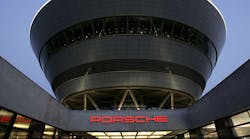Porsche and Boeing Co. are joining forces to push into the nascent area of urban flights with a plan for a high-end machine capable of vertical takeoff and landing.
The pair will create a team to explore the market potential for premium flying vehicles, they said Thursday after signing an initial pact. Work will involve engineers from Boeing unit Aurora Flight Sciences and the testing of a prototype.
“Porsche is looking to enhance its scope as a sports car manufacturer by becoming a leading brand for premium mobility,” Porsche sales head Detlev von Platen said Thursday. “This could mean moving into the third dimension of travel.”
Transport and technology companies across the globe are stepping up development of drones and other machinery to add more flexible options for people and goods in increasingly congested city centers. German startup Volocopter GmbH, backed by Daimler AG and the Mercedes-Benz maker’s biggest shareholder Zhejiang Geely Holding Group, recently completed a test flight in Stuttgart with a prototype that looks like a mix between a helicopter and a drone.
The partnership marks the latest foray by Boeing into futuristic vehicles that may one day soar above cities. As well as buying pioneer dronemaker Aurora Flight Sciences in 2017, it’s funding a lab at Stanford University devoted to new flying machines.
Commercial flying taxis could take off within the next five years, Boeing Chief Executive Officer Dennis Muilenburg said last week. Daunting hurdles remain before drones can be widely deployed, including an air traffic management system capable of staying on top of a chaotic city environment.
Porsche’s consulting arm expects the urban air mobility market to pick up after 2025. Its research indicates new transportation options could move passengers “more quickly and efficiently than current conventional means of terrestrial transport, at a lower cost and with greater flexibility,” the Volkswagen AG unit said in a statement.



